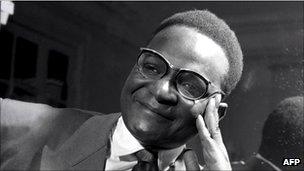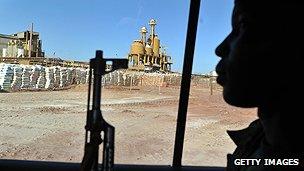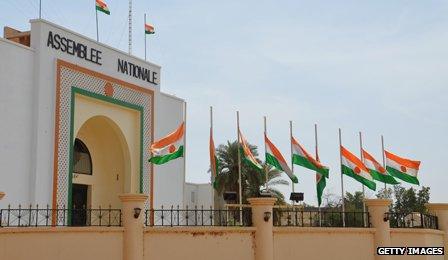Niger profile
- Published
A chronology of key events:
1890 - French occupy Niger.

President Hamani Diori led Niger for 14 years after independence before being overthrown in a coup
1958 - Niger becomes autonomous republic of the French Community.
1960 - Niger becomes independent; parliament elects Hamani Diori president.
1968-73 - Severe drought devastates Niger's livestock and crop production.
1974 - Hamani Diori overthrown in military coup led by Lt-Col Seyni Kountche.
1987 - Ali Seybou, the armed forces chief of staff, succeeds Kountche who dies of a brain tumour.
1989 - A new constitution brings Niger back to civilian rule, but under a one-party system; Seybou re-elected president.
Ban on parties lifted
1990 - Seybou legalizes opposition parties following a wave of strikes and demonstrations.
1990 - Rebellion by Tuareg people in the north begins.
1991 July - Constitutional conference strips Seybou of his powers and sets up a transitional government under Andre Salifou.
1992 - New constitution allowing multiparty elections ratified.
1993 - Mahamane Ousmane elected president and his coalition, the Alliance of the Forces of Change wins a majority of seats in parliament.
1995 - Ceasefire between the government and the Tuareg's Revolutionary Armed Forces of the Sahara comes into effect.
More coups
1996 January - Ousmane ousted in a coup led by Col Ibrahim Mainassara, who bans all political parties.
1996 May - New constitution giving the president increased powers approved in a referendum; ban on political parties lifted.
1996 July - Mainassara wins presidential election.
1997 - The Democratic Renewal Front, a hard-line Tuareg group, signs peace accord with government.
1999 April - Major Daouda Wanke assumes power following the assassination of Mainassara by his bodyguards.
1999 August - New constitution reversing the increase in the presidency's powers approved in a referendum.
1999 October and November - Mamadou Tandja elected president and his party, the National Movement for the Society in Development, wins majority of seats in parliament.
2001 January - Niger bans hunting in an effort to save its wildlife population, which includes the lion, the giraffe and the hippopotamus.
2002 August - Soldiers mutiny in the east and in the capital and demand the payment of wage arrears and better conditions. The rebellions are put down.
Uranium claim
2003 January - US President George W Bush claims Iraq tried to acquire uranium from Niger for its nuclear programme. The claim also made in UK's September 2002 dossier on Iraq.
2003 March - Nuclear watchdog tells UN that documents relating to Iraq-Niger uranium claim are forged, concludes specific allegations are unfounded.
2004 July - First-ever local elections. Parties backing the president win most of the seats.
2004 December - President Mamadou Tandja wins a second term in office with 65.5% of the vote in a second-round ballot.
2005 July - International Court of Justice awards Niger most of the river islands along its disputed border with Benin.
Tuareg rebellion
2007 August - Government declares alert in the north, giving the army greater powers to fight Tuareg rebels who have staged deadly attacks over the past six months.
2008 June - Police arrest former Prime Minister Hama Amadou on charges of embezzling state funds.
2009 April - Government and Tuareg rebels of the Movement of Niger People for Justice (MNJ) agree to end hostilities after talks in Libyan capital Tripoli.
2009 May-June - President Mamadou Tandja suspends constitution and assumes emergency powers after Constitutional Court rules against his plans for a referendum on whether to allow him to seek a third term.
2009 August - Much-criticized referendum endorses new constitution which allows President Tandja to rule for three more years and gives him broader powers.
2009 October - Opposition boycotts election to replace parliament that President Tandja dissolved to stop it blocking his constitutional changes. Mr Tandja's supporters win overwhelming victory over independent candidates.
Coup
2010 February - President Tandja is ousted in a coup and a senior army officer, Col Salou Djibo, named head of a military government. The African Union suspends Niger's membership.
2010 March - Coup leader Col Salou Djibo promises to return Niger to democracy, but sets no date for elections.
Military junta appoints a transitional government headed by a civilian prime minister, Mahamadou Danda.
2010 May - Food shortages affecting 7 million people, aid agencies say.

The French-owned uranium mine near Arlit, where several foreigners were kidnapped
2010 October - New constitution designed to restore civilian rule approved in referendum.
Return to civilian rule
2011 March - Mahamadou Issoufou wins presidential elections and is sworn in the following month.
2011 May - Former President Mamadou Tandja, who was ousted in the 2009 coup, is released from prison after charges of misappropriating public funds are dropped.
2011 July - Five soldiers arrested for allegedly plotting to assassinate President Issoufou and take power in a coup.
2012 February - Thousands cross into Niger to escape fighting in Mali.
2013 May - Suicide bombers stage separate attacks on a military barracks and a French-run uranium mining site in the north. The government blames al-Qaeda-linked militants.
2013 June - Historical city of Agadez awarded World Heritage status by UNESCO.

Flags fly at half-mast to during three days of mourning for 92 migrants who perished while trying to make a desert crossing
2014 May - Niger and French nuclear energy group Areva agree a new deal for mining uranium, involving an increase in royalties, which critics had said were too low.
Man sentenced following the first ever conviction for slavery in Niger.
2014 May - A man is sentenced to four years in jail in the first ever conviction for slavery in the country.
2015 February - Niger agrees to contribute to a regional force to fight Boko Haram militants.
2015 November - Opposition leader Hama Amadou is arrested on his return to the country, year after fleeing to avoid child-trafficking charges. He is later approved as a candidate the forthcoming presidential polls.
2016 March - Mahamadou Issoufou is re-elected in a run-off election boycotted by supporters of his opponent, Hama Amadou.
2016 June - Boko Haram militants attack the southeastern town of Bosso, killing 30 soldiers.
2016 September - The US confirms that it is building a military base in the central city of Agadez capable of deploying drones against militants.
2017 March - State of emergency declared in western areas bordering Mali following attacks blamed on militants linked to the Movement for Oneness and Jihad in West Africa.
A court sentences exiled opposition leader Hama Amadou to a year in prison for child smuggling. He was not in court and denied the charges, describing them as politically motivated.
2017 April - The military says it has killed 57 members of Boko Haram who attacked a military position near Gueskerou, in the south-east.
2017 July - Five West African countries, including Niger, launch a new regional force to confront Islamic militants in the Sahel region.
2017 October - Three US commandos on a joint patrol with local troops are killed in an ambush near Tongo Tongo.
2018 January - Italy's parliament approves the deployment of up to 470 troops in Niger to combat migration and the trafficking of people towards Europe.
2021 April - Former interior minister Mohamed Bazoum is sworn in as president in Niger's first democratic transfer of power since independence.